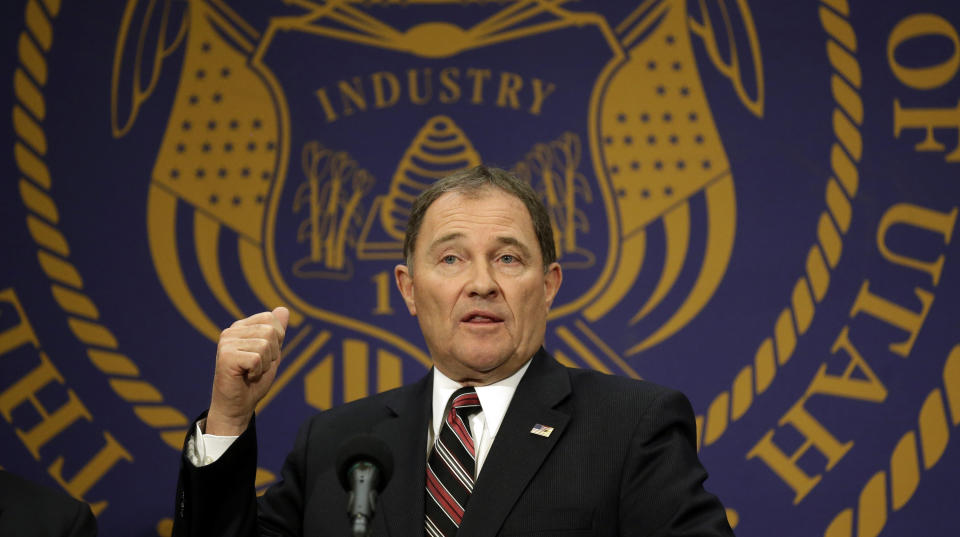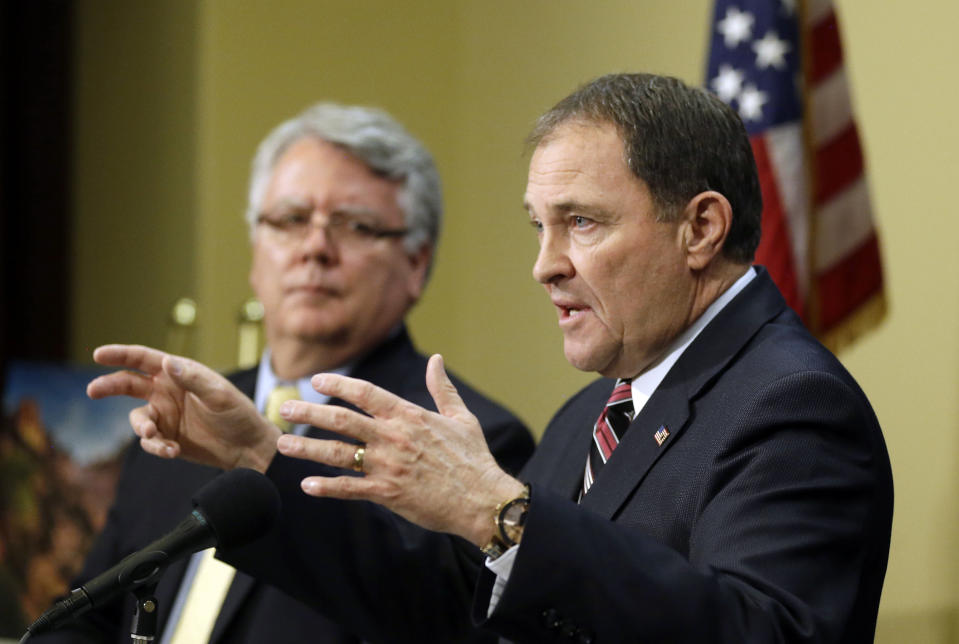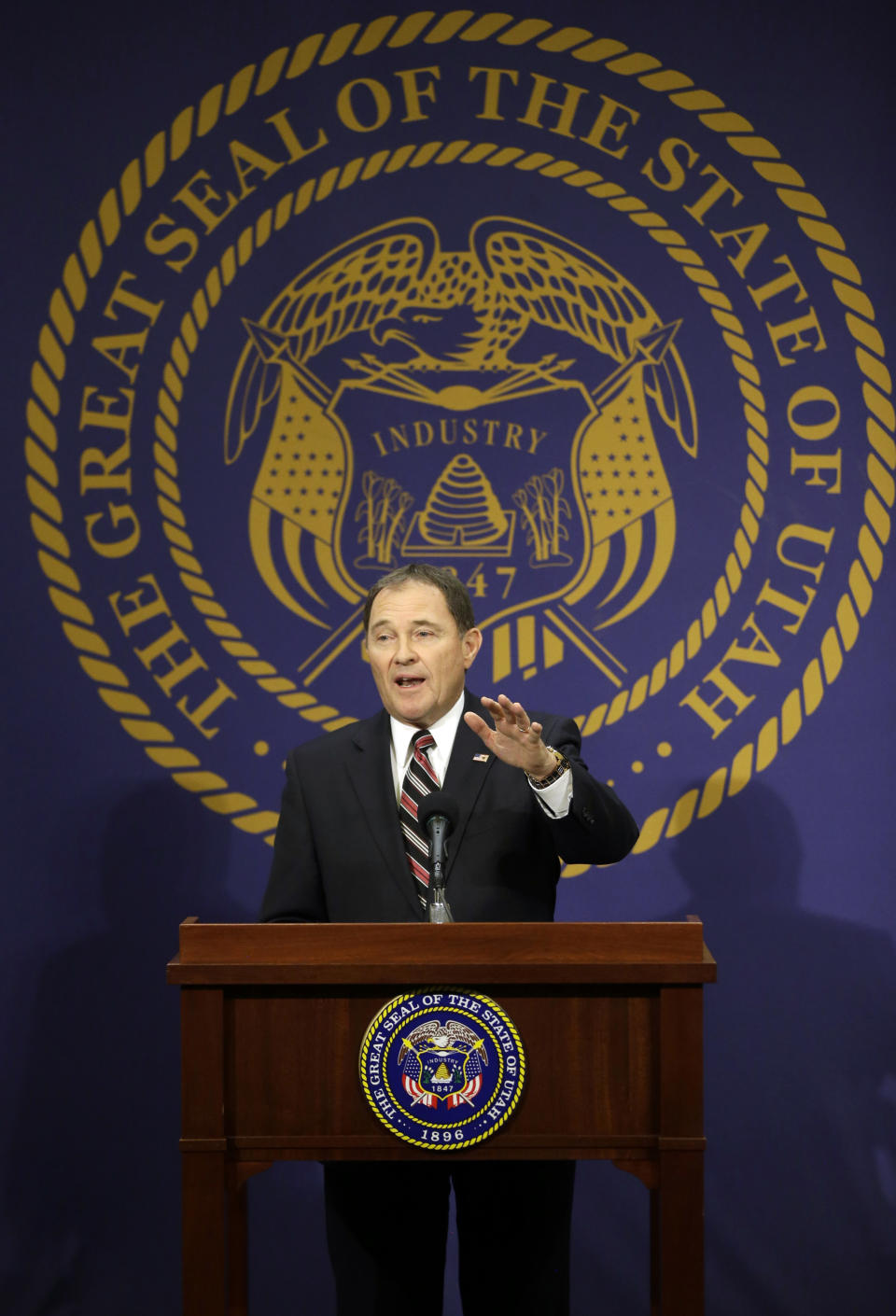Utah GOP governor rejects full Medicaid expansion
SALT LAKE CITY (AP) — Utah's Republican governor announced Thursday he wants to reject a full Medicaid expansion that would enroll more people in the government program, and instead, seek federal dollars to cover the poor in private plans.
Gov. Gary Herbert's decision came after months of pushing back an announcement, making him one of the last governors in the country to announce his intentions about expanding Medicaid.
Herbert, like many Republican governors, is opposed to President Barack Obama's health law but has said the state has an obligation to help the poor.
"If the federal government will just block grant us the money, take away the strings and give us maximum flexibility, we will find innovative ways to do things better," Herbert said.
About 60,000 Utah residents are not covered by Medicaid or eligible for federal subsidies to pay for private insurance.
"This flaw, this hole, is not of our own doing," Herbert said. "But I do believe we have a moral obligation to ensure that the poorest Utahns can obtain good, quality health care."
His plan would set up a three-year pilot program that would use about $250 million that Utah would have received to essentially cover all those who would fall under a full expansion. The grant money would instead help them purchase health insurance in the private market.
All participants would have co-payments. Those with slightly higher incomes would pay up to 2 percent of their monthly incomes to help pay their insurance premiums.
"That's much better than having to do it a one-size-fits-all way out of Washington, D.C," Herbert said.
The plan would cover the 60,000 falling through the gap, and then some, helping about 111,000 people.
The block-grant path is relatively unique but shares similarities with plans in other states, such as Arkansas and Iowa, which have received federal approval.
Utah, too, would have to receive a waiver from the federal government.
Mike Fierberg, a regional spokesman for the Centers for Medicare and Medicaid Services, said in a statement Thursday that the agency will consider Utah's request if it's written and presented.
"We can have no comment on the existing proposals, since nothing is final, and as such any comment would be speculative," he said.
Herbert's plan appears to seek unprecedented flexibility, said Judy Solomon, vice president for health policy at the Center on Budget and Policy Priorities, which advocates for low-income people.
Solomon said she needs to see more details about the plan to know if the federal government would be willing to negotiate with Utah, but she said it appears to be a longshot.
"Giving money without any protections is not something that is likely to happen because the federal government has interest in how those funds are spent," Solomon said.
Under the federal health care law, states have the option of expanding eligibility for Medicaid, the state-federal program for low-income people.
If states expand the program to include people making up to 138 percent of the federal poverty level, the federal government has offered to pick up the full cost through 2016. After that, reimbursement levels will gradually fall to 90 percent by 2020.
Like other Republican governors, Herbert has resisted embracing full expansion, citing fears that the federal government may fail to keep its part of the agreement down the road.
Overall, 25 states and Washington, D.C., are expanding their Medicaid programs, while 19 others have opted not to expand. Decisions are pending in other states.
There is no deadline to decide, but states could risk losing out on federal dollars the longer they hold off.
Herbert said his plan "in many ways mirrors the Medicaid expansion" but emphasized that it is not Medicaid expansion.
Beyond federal approval, Herbert also needs to secure the support of Utah's Republican-controlled Legislature, which has less than two weeks left in its 2014 session.
In states like Arkansas and Arizona, plans to expand Medicaid have been hung up as Republican governors wrestled to get GOP-controlled Legislatures to agree to fund the plans.
In Utah, Herbert's administration has been holding closed-door talks with lawmakers to find middle ground on the issue.
Herbert's toughest battle is expected to be with Republicans in the House, who have put forward their own plan.
It rejects more than $500 million from the federal government, but would spend $30 million to $35 million in state money to cover the neediest of people living below the poverty line.
Herbert has called the plan illogical, and reiterated Thursday that Utah residents send their tax dollars to Washington, D.C., so they deserve to have them returned to their state and spent there.
In the Senate, Republicans have discussed several options but have not coalesced around a single plan.
Democrats have pushed for full expansion, saying it makes the most sense morally and financially.
"Block grants are never an entirely secure way to fund programs," said Sen. Gene Davis, a Salt Lake City Democrat. "The coverage gives us hope, but there are many details that still require approval by the federal government."
___
Associated Press writers Brady McCombs and Annie Knox contributed to this report.



